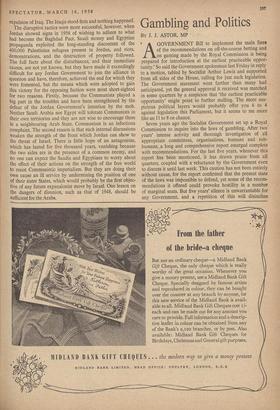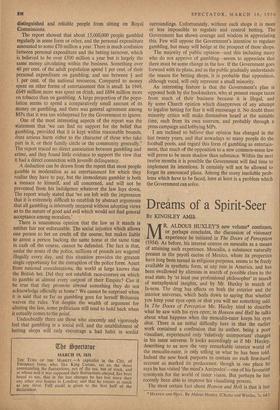Gambling and Politics
BY J. J. ASTOR, MP AGOVERNMENT Bill to implement the main lines of the recommendations on off-the-course betting and on gaming made by the Royal Commission is being prepared for introduction at the earliest practicable oppor- tunity.' So said the Government spokesman last Friday in reply to a motion, tabled by Socialist Arthur Lewis and supported from all sides of the House, calling for just such legislation. The Government statement went farther than many had , anticipated, yet the general approval it received was matched in some quarters by a suspicion that 'the earliest practicable opportunity' might point to further stalling. The more sus- picious political layers would probably offer you 6 to 4 against legislation this Parliament, but it seems to me more like an 11 to 8 on chance.
Seven years ago the Socialist Government set up a Royal, Commission to inquire into the laws of gambling. After two years' intense activity and thorough investigation of all appropriate committees, organisations, humans and sub- humans, a long and comprehensive report emerged complete with recommendations. For the last five years, whenever this report has been mentioned, it has drawn praise from all quarters, coupled with a reluctance by the Government even to discuss it until last week. This caution has not been entirely without cause, for the report confirmed that the present state of the laws was impossible to defend, yet some of the recom- mendations it offered could provoke hostility in a number of marginal seats. But five years' silence is unwarrantable ,for any Government, and a repetition of this will disincline distinguished and reliable people from sitting on Royal Commissions.
The report showed that about 15,000,000 people gambled regularly in some form or other, and the personal expenditure amounted to some £70 million a year. There is much confusion between personal expenditure and the betting turnover, which is believed to be over £500 million a year but is largely the same money circulating within the business. Something over 40 per cent. of the adult population spend 1 per cent. of their personal expenditure on gambling, and use between and 1 per cent. of the national resources. Compared to money spent on other forms of entertainment this is small. In 1949, £649 million more was spent on drink, and £694 million more on tobacco than on gambling. A large proportion of the popu- lation seems to spend a comparatively small amount of its money on gambling, and there was general agreement among M Ps that it was too widespread for the Government to ignore.
One of the most interesting aspects of the report was the statement that 'we can find no support for the belief that gambling, provided that it is kept within reasonable bounds, does serious harm either to the character of those who take part in it, or their family circle or the community generally.' The report traced no direct association between gambling and crime, and they found little evidence to support the view that it had a direct connection with juvenile delinquency.
A deduction can be drawn from the report that most people gamble in moderation as an entertainment for which they realise they have to pay, but the immoderate gambler is both a menace to himself, and all concerned, and will not be prevented from his indulgence whatever the law lays down. The report wisely stated that 'we are left with the impression that it is extremely difficult to establish by abstract arguments that all gambling is inherently immoral without adopting views as to the nature of good and evil which would not find general acceptance among moralists.'
There is unanimous opinion that the law as it stands is neither fair nor enforceable. The social injustice which allows one person to bet on credit off the course, but makes liable to arrest a person backing the same horse at the same time in cash off the course, cannot be defended. The fact is that, under the noses of the police, millions of pounds are wagered illegally every day, and this situation provides the greatest single opportunity for the corruption of the police force. Apart from national considerations, the world at large knows that the British bet. Did they not establish race-courses on which to gamble at almost every outpost of their Empire? Can it be true that they promote abroad something they do not acknowledge officially at home? We cannot be surprised when it is said that as far as gambling goes for herself Britannia waives the rules. Yet despite the wealth of argument for altering the law, some politicians still tend to hold back when it actually comes to the point.
Undoubtedly there are those who sincerely and vigorously feel that gambling is a social evil, and the establishment of betting shops will only encourage a bad habit in sordid surroundings. Unfortunately, without such shops it is more or less impossible to regulate and control betting. The Government has shown courage and wisdom in appreciating this. Few will oppose the Government's intention to regulate gambling, but many will hedge at the prospect of these shops.
The majority of public opinion—and this including many who do not approve of gambling—seems to appreciate that there must be some change in the law. If the Government goes forward with its plans, and as the public gradually understands the reason for betting shops, it is probable that opposition, although vocal, will only represent a small minority.
An interesting feature is that the Government's plan is opposed both by the bookmakers, who at present escape taxes from much of their business because it is illegal, and by some Church opinion which disapproves of any attempt to legalise betting for fear it will encourage it. No doubt these minority critics will make themselves heard at the suitable time, each from its own rostrum, and probably through a press campaign and lobbying MPs.
I am inclined to believe that opinion has changed in the last twenty years, and that nowadays so many people do the football pools, and regard this form of gambling as entertain- ment, that much of the opposition to a new common-sense law will prove to be more shadow than substance. Within the next twelve months it is possible the Government will find time to implement its intentions. It certainly will not be allowed to forget its announced plans. Among the many insoluble prob- lems which have to be faced, here at least is a problem which the Government can solve.



































 Previous page
Previous page